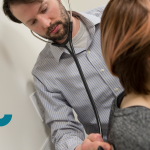Share
Competence Corner: Introducing the Physician Practice Improvement Program (PPIP)
By: Shelley Howk, BSc, MD, CCFP, FCFP
Senior Medical Advisor, Continuing Competence
As a family physician who has practiced in Alberta for 25 years, I understand the rigorous demands of running a practice and keeping up-to-date on knowledge and skills while putting patient care at the forefront. I believe that physicians in Alberta do an amazing job fulfilling these roles. I also know being asked to do “one more thing” can sometimes be overwhelming. Now that I work as a Senior Medical Advisor in Continuing Competence at CPSA, I understand the challenges of medical regulation but also bring with me some of the wisdom I learned from all those years in practice.
Here is what I have learned since joining CPSA:
- In the past, CPSA’s primary role has been registration and complaints. These departments still exist, of course, but in the last several years, more emphasis has been put on continuing competence, in both quality assurance and quality improvement.
- Most complaints fall into three categories:
- Clinical (the actual investigation, treatment, management and documentation of patient complaints): 40 per cent.
- Process gaps (lost or non-actioned test results, patients lost to follow up with consultants, communication deficiencies between various factions in the healthcare system): 40 per cent
- Miscellaneous: 20 per cent
- CPSA has a legislated mandate to “ensure competency in the profession”, reportable yearly to the provincial ombudsman. This is a requirement of being a self-regulated profession.
- An additional privilege of being a self-regulated profession is our commitment to life-long learning and its implementation into our work.
- Although the national agencies do track and record completion of continuing medical education (CME) credits, not all CME results in practice improvement or change.
- Physician burnout across the country is higher than it has ever been. We need to consciously address this and encourage mentorship and support amongst our colleagues.
Given these factors, the Physician Practice Improvement Program (PPIP) is in development at CPSA, with your help and input. This initiative has three goals:
- Ensure value to physicians by enabling learning, fostering reflection and empowering change.
- Collaborate with partners to ensure physician activities align with requirements across several organizations (such as national college CME, AHS privileging, PCN targets), to minimize duplication for physicians.
- Fulfill CPSA’s legislated mandate to ensure competency in a specific and accountable manner.
CPSA’s new PPIP recognizes the work physicians do in their clinics every day and seeks to highlight opportunities to improve our system, one small step at a time. It also emphasizes personal growth and physician wellness. Through the cycle of continuous quality improvement and personal development, CPSA hopes to support both patients and physicians in ongoing learning and best practice.
CPSA tools such as the Group Practice Review and Multisource Feedback Plus are still available to support physicians in this work, however PPIP encourages individuals and groups to develop the skills and abilities to understand their practice, and identify and action areas for improvement in their professional and personal lives on a regular basis.
We have been working with your colleagues on various committees to develop these program resources and required elements, to ensure initiatives have the best chance to succeed and impact improvement and change. Stay tuned for more information in the coming months.
I am thankful to the many individuals helping with this process but the fact is, we need all physicians to get involved. If a program or resource is helpful, useful and results in some positive change for you or your clinic, we need to hear about it. Conversely, if it is not worthwhile, has taken away precious practice time without resulting in quality changes, we need to know that too. Just as every practice has opportunities for quality improvements, CPSA’s PPIP initiative also needs feedback to follow the same principles and strive for better models going forward.
If you have suggestions, feedback or questions, please feel free to contact me directly at Shelley.Howk@cpsa.ab.ca.
Help us “do it better.”
Thank you.
Related News
All News & EventsAugust 10, 2023
Clarification: Virtual Care standard of practice
August 10, 2023
Are you up to standard? The importance of working together for patient safety
June 8, 2023
Consultation 026: Provide feedback on four standards
May 11, 2023
























Comments for this post are now closed. If you would like to share your feedback on this topic, please email support@cpsa.ca.